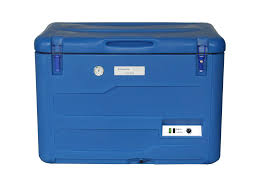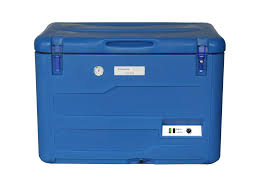BLOOD BANK REFRIGERATOR (MB3000G), 230V, 100 bags 450ml
Outdated Article
BLOOD BANK REFRIGERATOR, 100 bags
CAUTION
This article will not be available anymore starting from January 2025. Please contact your laboratory referent for other options.
Definition
The blood bank refrigerator MB3000G is used to store blood products at a temperature of +4°C in a temperatures range between +2 and +6°C.
The storage capacity can go up to 100 bags of 450 ml.
The ice-lining consists of icepacks filled with water in order to increase the thermal inertia.
Specifications
Electrical blood bank refrigerator with blood storage capacity of 100 units of blood bags of 450 ml.
Material
External / internal material : polyethylene
Insulation material: 100 mm polyurethane foam / foaming agent; cyclopentane
Technical specifications
- Thermostat
- Set-Point: +4°C
- Digital display of temperature (0.1°C)
- Compressor type: compressor NL9FT
- Fan air cooling
- Refrigerant: 142gr R134a
- Capillary tube: DU = 0.7 x 2700 mm
- Evaporator type: tube
- Audible and visual alarm
- Installed icelining: 36 x 0.6l to be filled with water
- Hold over time at 43°C: 20h (100 bags)/ 22h (30 bags)
- Power supply: mains AC
- Voltage: 220 - 240 V / 50 - 60 Hz
- Power: 220 W
- Energy consumption
- 1.1kWh/24h at 32°C
- 1.5kWh/24h at 43°C
- Integrated rechargeable battery: lead-acid
Dimensions
- External dimensions (HxWxD): 910 x 1270 x 780 mm
- Gross volume: 278 l / net volume: 204 l
- Weight net: 105 kg
Transport Dangerous Goods
UN2811 special provision A26: Refrigerating machines include air conditioning units and machines or other appliances which have been designed for the specific purpose of keeping food or other items at low temperature in an internal compartment. Refrigerating machines and refrigerating machine components are considered not subject to these Instructions if containing less than 12 kg of a gas in Division 2.2 or if containing less than 12 L ammonia solution (UN2672).
The finished product contains less than 12 kg of gas and is therefore not subject to transport regulations.
Supplied with the Article
- 5 vaccine storage baskets
- lockable lid
- 2 spacers
- 38 ice packs of 0.6l
Instructions for use
Read carefully the operating instructions before use
Precautions for Use
- Ensure that there is sufficient room around the unit for air circulation
- Do not locate the unit below a ceiling fan or right next to air-conditioning equipment.
- The unit must be transported in an upright position only (maximum inclination 45°).
- To prevent problems with other electrical equipment causing this unit to malfunction, it should be connected to a separate circuit. Never connect the unit to a single socket with other electrical equipment by means of a multi-socket.
- Secure all electrical devices in the laboratory with a UPS double conversion (see related articles below). To define the best sizing of the UPS, contact your biomedical or energy referent.
Maintenance
- Clean or disinfect the unit inside and outside before using it. Use only gentle cleaning agents.
- Never use aggressive or caustic cleaning agents, scouring powder, steel wool, abrasive sponges or chemical solvents.
- When cleaning, make sure that no fluids of any kind run into the ventilation housing.
- Read carefully the operator manual for more details on the cleaning and maintenance.
Waste management
Before scrapping the unit, arrange for the lead accumulator to be removed and disposed of separately.
Be sure to remove the lead-acid rechargeable battery and dispose of separately.
MSF requirements
Refrigerator complying to the minimal requirements for the storage of blood products, in the MSF field conditions. Supplied with a visible and audible alarm installed.





![[ELAEBBRA001] AUDIBLE & VISUAL alarm, for BLOOD BANK, 230V, 40mA](/web/image/product.template/578276/image_256/%5BELAEBBRA001%5D%20AUDIBLE%20%26%20VISUAL%20alarm%2C%20for%20BLOOD%20BANK%2C%20230V%2C%2040mA?unique=953da8b)
![[ELAEBBRE31B] BLOOD BANK REFRIGERATOR (MRB3000SDD)+ AC/DC ADAPTOR, 90 bags](/web/image/product.template/588033/image_256/%5BELAEBBRE31B%5D%20BLOOD%20BANK%20REFRIGERATOR%20%28MRB3000SDD%29%2B%20AC-DC%20ADAPTOR%2C%2090%20bags?unique=b641e9b)
![[ELAEBBRS301] (blood bank MB3000G) STATIC RELAY 292.8109.98](/web/image/product.template/571523/image_256/%5BELAEBBRS301%5D%20%28blood%20bank%20MB3000G%29%20STATIC%20RELAY%20292.8109.98?unique=85b40e0)
![[ELAEBBRS302] (blood bank refrigerator MB3000G/MRB3000SDD)SEAL 294.5104.04](/web/image/product.template/572907/image_256/%5BELAEBBRS302%5D%20%28blood%20bank%20refrigerator%20MB3000G-MRB3000SDD%29SEAL%20294.5104.04?unique=0cccd2b)
![[ELAEBBRS303] (blood bank refrigerator MB3000G/MRB3000SDD)SEAL 294.5104.03](/web/image/product.template/572909/image_256/%5BELAEBBRS303%5D%20%28blood%20bank%20refrigerator%20MB3000G-MRB3000SDD%29SEAL%20294.5104.03?unique=0cccd2b)
![[ELAEBBRS304] (blood bank MB3000G) BATTERY 12V 292.9867.15](/web/image/product.template/572910/image_256/%5BELAEBBRS304%5D%20%28blood%20bank%20MB3000G%29%20BATTERY%2012V%20%20292.9867.15?unique=63047ae)
![[ELAEBBRS305] (blood bank MB3000G) MOTOR FAN 296.9759.51](/web/image/product.template/570764/image_256/%5BELAEBBRS305%5D%20%28blood%20bank%20MB3000G%29%20MOTOR%20FAN%20296.9759.51?unique=0cccd2b)
![[ELAEBBRS306] (blood bank MB3000G) ELECTRONIC BOARD 296.9769.03](/web/image/product.template/571243/image_256/%5BELAEBBRS306%5D%20%28blood%20bank%20MB3000G%29%20ELECTRONIC%20BOARD%20296.9769.03?unique=7bdff27)
![[ELAEBBRS307] (blood bank MB3000G) LATCH/LOCK blue w/o padlock 292.8506.11](/web/image/product.template/572989/image_256/%5BELAEBBRS307%5D%20%28blood%20bank%20MB3000G%29%20LATCH-LOCK%20blue%20w-o%20padlock%20292.8506.11?unique=bdf6a23)
![[ELAEBBRS308] (blood bank MB3000G) LOCK with padlock 292.8506.12](/web/image/product.template/573009/image_256/%5BELAEBBRS308%5D%20%28blood%20bank%20MB3000G%29%20LOCK%20with%20padlock%20292.8506.12?unique=a707cb8)
![[ELAEBBRS309] (blood bank MB3000G) DRAINAGE PLUG 292.2312.26](/web/image/product.template/573209/image_256/%5BELAEBBRS309%5D%20%28blood%20bank%20MB3000G%29%20DRAINAGE%20PLUG%20292.2312.26?unique=c093711)
![[ELAEBBRS310] (blood bank MB3000G) KEYLOCK SWITCH 296.8954.73](/web/image/product.template/572098/image_256/%5BELAEBBRS310%5D%20%28blood%20bank%20MB3000G%29%20KEYLOCK%20SWITCH%20296.8954.73?unique=8cb9fe7)
![[ELAEBBRS311] (blood bank MB3000G) WAGO CONNECTOR 262-331, 292.2404.95](/web/image/product.template/572096/image_256/%5BELAEBBRS311%5D%20%28blood%20bank%20MB3000G%29%20WAGO%20CONNECTOR%20262-331%2C%20292.2404.95?unique=f89e72e)
![[ELAEBBRS312] (blood bank MB3000G) PLUG PHOENIX 1825527, 296.2024.57](/web/image/product.template/572095/image_256/%5BELAEBBRS312%5D%20%28blood%20bank%20MB3000G%29%20PLUG%20PHOENIX%201825527%2C%20296.2024.57?unique=f89e72e)
![[ELAEBBRS313] (blood bank MB3000G) FRAME PHOENIX 1852040, 296.2024.59](/web/image/product.template/572094/image_256/%5BELAEBBRS313%5D%20%28blood%20bank%20MB3000G%29%20FRAME%20PHOENIX%201852040%2C%20296.2024.59?unique=f89e72e)
![[ELAEBBRS314] (blood bank MB3000G) ICE PACK empty 0.6l, for water](/web/image/product.template/578190/image_256/%5BELAEBBRS314%5D%20%28blood%20bank%20MB3000G%29%20ICE%20PACK%20empty%200.6l%2C%20for%20water?unique=16bb8b4)
![[ELAEBBRS315] (blood bank MB3000G) CPL INTERFACE 296.9768.11](/web/image/product.template/578191/image_256/%5BELAEBBRS315%5D%20%28blood%20bank%20MB3000G%29%20CPL%20INTERFACE%20296.9768.11?unique=1359372)
![[ELAEBBRS316] (blood bank MB3000G) HINGE OUTSIDE 292.8503.34](/web/image/product.template/580305/image_256/%5BELAEBBRS316%5D%20%28blood%20bank%20MB3000G%29%20HINGE%20OUTSIDE%20292.8503.34?unique=fbb10f9)
![[ELAEBBRS317] (blood bank MB3000G) HINGE INSIDE 292.8503.35](/web/image/product.template/580306/image_256/%5BELAEBBRS317%5D%20%28blood%20bank%20MB3000G%29%20HINGE%20INSIDE%20292.8503.35?unique=fbb10f9)
![[KPROMPOSUA06X] MODULE UPS double convers. (Delta RT EXTEND.) 6kVA, 1ph/1ph](/web/image/product.template/577879/image_256/%5BKPROMPOSUA06X%5D%20MODULE%20UPS%20double%20convers.%20%28Delta%20RT%20EXTEND.%29%206kVA%2C%201ph-1ph?unique=df96342)